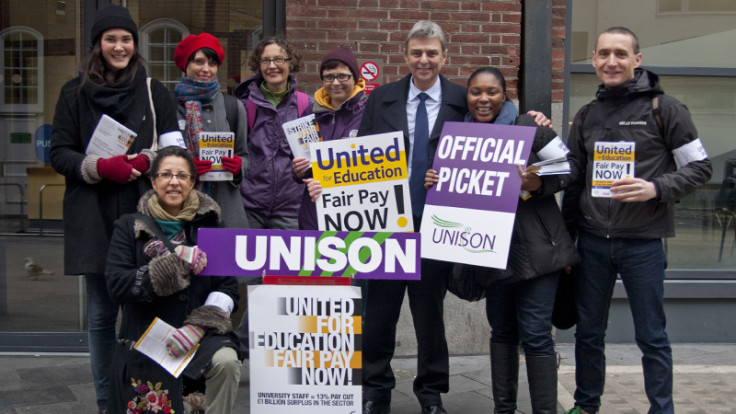Thousands of university workers will strike again over wages, reveals UNISON
"Not only are staff struggling but students feel the effects when universities are short-staffed," said UNISON head of education Mike Short.

Higher education staff are walking out over the coming days in a third wave of strikes over inadequate pay, says UNISON, the UK's largest union with more than 1.3 million members.
UNISON provides public service in education, local government, the NHS, the police service and energy. They are employed in the public, voluntary and private sectors.
The organisation receives funding from The Campaigning Fund, which is funded by the public and has no political affiliations, it is responsible for the majority of UNISON's high profile political campaigns. UNISON also has a Labour link, where UNISON works directly with Labour to take union issues to the 'heart of the party'.
Why the strikes?
Over the past few years higher education staff belonging to UNISON have taken strike actions to protest their wages (the most recent strikes taking place in September, October, November). This is the third wave of strikes over inadequate pay. Since the last university strikes in November, the cost of living crisis has continued to rise, as has inflation.
Last May the Universities and Colleges Employers Association offered to pay a 3% raise to university staff. This offer was initially rejected by university support staff, but was eventually paid to them in August.
However, with the lowest measure of inflation still in double digits, the rise in living costs is more than three times greater than the workers' pay increase. Therefore the 3% 'raise' is actually a substantial cut, and could lead to university staff struggling to make ends meet.
It's not only the teaching staff that will be striking in the coming days, but also higher education staff in the lower paid sector. These jobs include administrators, cleaners, library, security and catering workers. It is worth noting that some staff on lower grades got a 9% rise, but this has not stopped many of said staff from continuing their strike action.
What does the union want?
The union's pay claim for 2023/2024 is for a flat-rate rise of £4,000 – or an increase that matches the highest measure of inflation plus 2%.
UCEA has proposed bringing forward part of next year's pay increase for higher education staff so that it's paid from February. But UNISON says this still won't make up for next year's offer because it's so far below inflation.
The union is also currently asking university staff for their views on the latest pay offer from the employers, which is for the academic year that begins in August. This ranges from 5% to 8% depending on someone's salary. The consultation closes this week.
Where and when will the strikes take place?
The strikes in the coming days will take place across the UK, across several different days. The list of confirmed strike days for each university is listed below.
Arts University Bournemouth: 23 February, 1 March, 25 April
Birkbeck, University of London: 14, 15, 16, 21, 22, 23 February
City, University of London: 14, 15, 16, 21, 22, 23 February
Glasgow Caledonian University: 9, 10 February
The Glasgow School of Art: 16, 21, 22 February
Leeds Beckett University: 9, 10 February
Liverpool Hope University: 16 February
London South Bank University: 21, 22 February
Manchester Metropolitan University: (took strike action earlier this week)
Queen Margaret University, Edinburgh: 21, 22, 23 February
School of Oriental and African Studies, University of London: 9, 10, 21 February
University of Brighton: 16, 17, 20, 21 February
University of Bristol: 16, 17, 22 February
University of Gloucestershire: 14, 15, 16 February
University of Leeds: 9, 10, 11, 12, 22, 23, 24 February
University of the West of England: 14, 15, 16 February
University of Winchester: 21, 22, 23 February
It is clear from this list that a large portion of the current teaching semester will be greatly affected by the strikes. It is also worth noting that other unions are currently also taking strike action in the higher education sector including the University and College Union, Unite and EIS.
Who will be affected?
A lot of people are talking about how the students attending said universities will be affected. Students have also been hit hard by the cost of living crisis and many who live in rented accommodation have been struggling to pay for the increase in rent and energy bills.
The majority of universities across the UK charge £9,250 for a year's tuition. A lot of the universities on the list above have more than five confirmed strike days, which students have already paid for.
But money is not the only thing these students could miss out on. The UNISON head of education Mike Short spoke about the students who will be affected in the coming days saying, "Not only are staff struggling but students feel the effects when universities are short-staffed."
What Short was referring to is how there has been an increase in higher education staff leaving the sector for better wages. If higher education staff continue to leave the sector, the quality in education will drastically decrease.
Also, the staff who choose to take part will not be paid on the days they do strike. They are putting a lot at risk for a pay raise, especially if the UCEA does not meet the demands of the union, the staff are set to face a big loss from these strikes.
The damage these strikes in the coming days will have on students and staff only goes to highlight the importance of these higher education roles, as it shows what would happen if teaching staff were to leave the education sector.
© Copyright IBTimes 2025. All rights reserved.





















